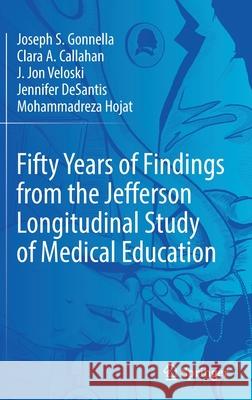Fifty Years of Findings from the Jefferson Longitudinal Study of Medical Education » książka



Fifty Years of Findings from the Jefferson Longitudinal Study of Medical Education
ISBN-13: 9783030853785 / Angielski / Twarda / 2021 / 240 str.
Fifty Years of Findings from the Jefferson Longitudinal Study of Medical Education
ISBN-13: 9783030853785 / Angielski / Twarda / 2021 / 240 str.
(netto: 325,85 VAT: 5%)
Najniższa cena z 30 dni: 327,68
ok. 22 dni roboczych
Bez gwarancji dostawy przed świętami
Darmowa dostawa!
Admissions.- Demographics.- Medical school evaluations.- Postgraduate and Career.- Psychosocial Attributes.- Professionalism.- Miscellaneous.
Joseph S. Gonnella received his B.A. from Dartmouth College (summa cum laude) and his M.D. from Harvard Medical School. He has been awarded the Commendatore dell'Ordine della Stella della Solidarieta Italiana; The Grande Ufficiale by the president of the Italian Republic; And The Dongbaeg Medal by the President of Korea; The Presidential Medal by Dartmouth College; and the Presidential Citation by Thomas Jefferson University. He has received honorary degrees from the University of Chieti, Italy. Soonchunhyang University, Korea; International Medical University of Malaysia; The University of Minho, Portugal. He received the Abraham Flexner Award from the Association of American Medical Colleges; and the Strittmatter Award from the Philadelphia County Medical Society.
This book assembles research findings accumulated over the span of half a century from the Jefferson Longitudinal Study (JLS). This study, initiated in 1970, is the most comprehensive, extensive, and uninterrupted longitudinal study of medical students and graduates maintained in a single medical school. The study was based on the conviction that medical schools have a social responsibility and ethical obligation to monitor the quality of their educational programs, to assess their educational outcomes, and to ensure that their educational goals have been achieved for the purposes of public safety. The JLS has resulted in a large number of publications in professional peer-reviewed journals and presentations in national and international meetings. A recent Google search using keywords “Jefferson Longitudinal Study” resulted in 2,140,000 hits (as of September 2021), an indication of its broad popularity among researchers. Some medical schools have expressed interest in learning more about the JLS, requesting copies of the instruments used in the study, information about how to set up a longitudinal study of medical education, and other needed resources. A schematic snapshot of the JLS was published in Academic Medicine [2011, 84(3), p. 404] for those interested in a heuristic model for the development of a longitudinal study of medical students and graduates.
Potential readers of the book include medical education researchers, faculty of medical schools and of other health professions academic centers, postgraduate medical education institutions (e.g., residency training programs, training hospitals and institutions), medical students, and readers of medical education journals (e.g., Academic Medicine, Advances in Health Sciences Education, Evaluation and the Health Professions, International Journal of Medical Education, The Journal of the American Medical Association, Medical Education, Medical Teacher, The New England Journal of Medicine, Teaching and Learning in Medicine, in which findings from the JLS have been published).
1997-2025 DolnySlask.com Agencja Internetowa
KrainaKsiazek.PL - Księgarnia Internetowa









